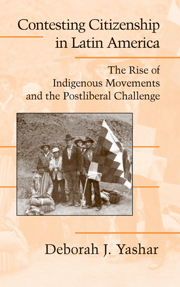 Contesting Citizenship in Latin America
Contesting Citizenship in Latin America 7 - DEMOCRACY AND THE POSTLIBERAL CHALLENGE IN LATIN AMERICA
Published online by Cambridge University Press: 05 September 2012
Summary
Latin American democracies are facing unprecedented challenges and opportunities. Indigenous people are stepping forward to demand new rights, seek equal protection, and articulate bold proposals for change. These are remarkable developments in a region where ethnic cleavages were once universally described as weak and indigenous people were described as politically irrelevant, at best, and anachronistic, at worst. By the end of the twentieth century, indigenous movements had grown in numbers and strength throughout much of Latin America. Indigenous activists, elected officials, and spokespersons are increasingly commonplace in protests, discussions, and deliberations over policy. In turn, politicians of all types have been forced to contend with multiculturalism, pluriethnicity, and multilingualism – in some cases reformulating constitutions, legislation, and ministerial charges to incorporate more inclusive language about diverse ethnic and racial populations. These unprecedented developments call out for an explanation.
This book has focused on explaining the contemporary and uneven emergence of Latin American indigenous movements – addressing both why indigenous identities have become politically salient in the contemporary period and why they have translated into significant political organizations in some places and not others. After briefly revisiting the argument developed in Parts I and II of this book, this chapter introduces a new question: what is the broader relevance of these movements for Latin American democracies?
In particular, this chapter poses the question: what political relevance do these contemporary indigenous movements have for the study of democracy and for the third-wave democracies that are now in place?
- Type
- Chapter
- Information
- Contesting Citizenship in Latin AmericaThe Rise of Indigenous Movements and the Postliberal Challenge, pp. 281 - 308Publisher: Cambridge University PressPrint publication year: 2005
